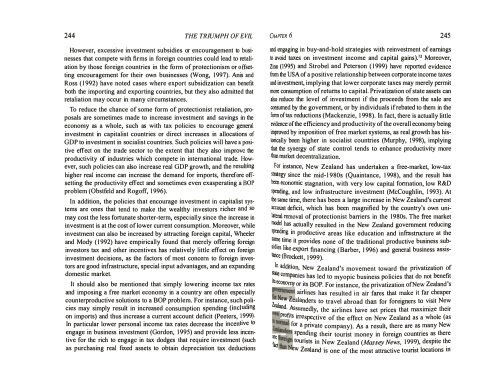austin-murphy-the-triumph-of-evil
austin-murphy-the-triumph-of-evil
austin-murphy-the-triumph-of-evil
Create successful ePaper yourself
Turn your PDF publications into a flip-book with our unique Google optimized e-Paper software.
244 THE TRIUMPH OF EVIL<br />
However, excessive investment subsidies or encouragement to businesses<br />
that compete with firms in foreign countries could lead to retaliation<br />
by those fo reign countries in <strong>the</strong> fo rm <strong>of</strong> protectionism or <strong>of</strong>fsetting<br />
encouragement for <strong>the</strong>ir own businesses (Wong, 1997). Anis and<br />
Ross (1992) have noted cases where export subsidization can benefit<br />
both <strong>the</strong> importing and exporting countries, but <strong>the</strong>y also admitted that<br />
retaliation may occur in many circumstances.<br />
To reduce <strong>the</strong> chance <strong>of</strong> some form <strong>of</strong> protectionist retaliation, proposals<br />
are sometimes made to increase investment and savings in <strong>the</strong><br />
economy as a whole, such as with tax policies to encourage general<br />
investment in capitalist countries or direct increases in allocations <strong>of</strong><br />
GOP to investment in socialist countries. Such policies will have a positive<br />
effect on <strong>the</strong> trade sector to <strong>the</strong> extent that <strong>the</strong>y also improve <strong>the</strong><br />
productivity <strong>of</strong> industries which compete in international trade. However,<br />
such policies can also increase real GOP growth, and <strong>the</strong> resulting<br />
higher real income can increase <strong>the</strong> demand for imports, <strong>the</strong>refore <strong>of</strong>fsetting<br />
<strong>the</strong> productivity effect and sometimes even exasperating a BOP<br />
problem (Obstfeld and Rog<strong>of</strong>f, 1996).<br />
In addition, <strong>the</strong> policies that encourage investment in capitalist systems<br />
are ones that tend to make <strong>the</strong> wealthy investors richer and so<br />
may cost <strong>the</strong> less fortunate shorter-term, especially since <strong>the</strong> increase in<br />
investment is at <strong>the</strong> cost <strong>of</strong>lower current consumption. Moreover, while<br />
investment can also be increased by attracting foreign capital, Wheeler<br />
and Mody (1992) have empirically found that merely <strong>of</strong>fering foreign<br />
investors tax and o<strong>the</strong>r incentives has relatively little effect on foreign<br />
investment decisions, as <strong>the</strong> factors <strong>of</strong> most concern to foreign investors<br />
are good infrastructure, special input advantages, and an expanding<br />
domestic market.<br />
It should also be mentioned that simply lowering income tax rates<br />
and imposing a free market economy in a country are <strong>of</strong>ten especiall�<br />
counterproductive solutions to a BOP problem. For instance, such policies<br />
may simply result in increased consumption spending (including<br />
on imports) and thus increase a current account deficit (Peeters, 1999).<br />
In particular lower personal income tax rates decrease <strong>the</strong> incentive to<br />
engage in business investment (Gordon, 1995) and provide less incentive<br />
for <strong>the</strong> rich to engage in tax dodges that require investment (such<br />
as purchasing real fixed assets to obtain depreciation tax deductions<br />
CHAPTER 6 245<br />
and engaging in buy-and-hold strategies with reinvestment <strong>of</strong> earnings<br />
to avoid taxes on investment income and capital gains ).'2 Moreover,<br />
Zinn (1995) and Strobel and Peterson (1999) have reported evidence<br />
from <strong>the</strong> USA <strong>of</strong> a positive relationship between corporate income taxes<br />
and investment, implying that lower corporate taxes may merely permit<br />
more consumption <strong>of</strong> returns to capital. Privatization <strong>of</strong> state assets can<br />
also reduce <strong>the</strong> level <strong>of</strong> investment if <strong>the</strong> proceeds from <strong>the</strong> sale are<br />
consumed by <strong>the</strong> government, or by individuals if rebated to <strong>the</strong>m in <strong>the</strong><br />
form <strong>of</strong> tax reductions (Mackenzie, 1998). In fact, <strong>the</strong>re is actually little<br />
evidence <strong>of</strong> <strong>the</strong> efficiency and productivity <strong>of</strong> <strong>the</strong> overall economy being<br />
improved by imposition <strong>of</strong> free market systems, as real growth has historically<br />
been higher in socialist countries (Murphy, 1998), implying<br />
that <strong>the</strong> synergy <strong>of</strong> state control tends to enhance productivity more<br />
than market decentralization.<br />
For instance, New Zealand has undertaken a free-market, low-tax<br />
strategy since <strong>the</strong> mid-l980s (Quaintance, 1998), and <strong>the</strong> result has<br />
been economic stagnation, with very low capital formation, low R&D<br />
spending, and low infrastructure investment (McCoughlin, 1993). At<br />
<strong>the</strong> same time, <strong>the</strong>re has been a large increase in New Zealand's current<br />
account deficit, which has been magnified by <strong>the</strong> country's own unilateral<br />
removal <strong>of</strong> protectionist barriers in <strong>the</strong> 1980s. The free market<br />
model has actually resulted in <strong>the</strong> New Zealand government reducing<br />
spending in productive areas like education and infrastructure at <strong>the</strong><br />
� time it provides none <strong>of</strong> <strong>the</strong> traditional productive business sub<br />
Sidles like export financing (Barber, 1996) and general business assis<br />
tance (Brockett, 1999).<br />
In addition, New Zealand's movement toward <strong>the</strong> privatization <strong>of</strong><br />
� companies has led to myopic business policies that do not benefit<br />
Its economy or its BOP. For instance, <strong>the</strong> privatization <strong>of</strong>New Zealand's<br />
ernment airlines has resulted in air fares that make it far cheaper<br />
r<br />
or New Zealanders to travel abroad than for foreigners to visit New<br />
Zealand. Assumedly, <strong>the</strong> airlines have set prices that maximize <strong>the</strong>ir<br />
:0 pr<strong>of</strong>its irrespective <strong>of</strong> <strong>the</strong> effect on New Zealand as a whole (as<br />
Z:l for a private company). As a result, <strong>the</strong>re are as many New<br />
are fl � S pending <strong>the</strong>ir tourist money in foreign countries as <strong>the</strong>re<br />
� :gn tourists in �ew Zealand (Massey News, 199 . 9), des�ite t�e<br />
New Zealand ts one <strong>of</strong> <strong>the</strong> most attractive tounst locations m


